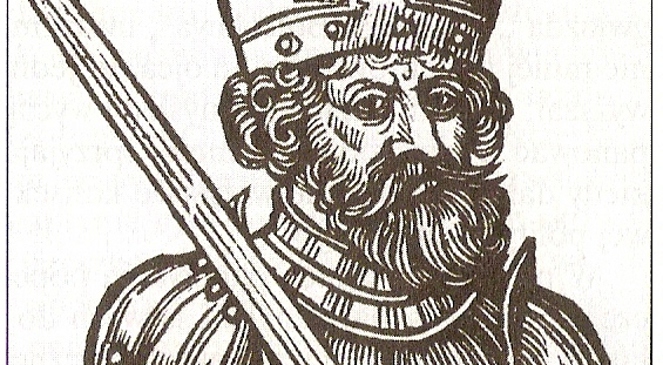
Bezprym or Bezprzem, Bolesław Chrobry's firstborn son, begotten with an unnamed Hungarian princess – perhaps Judith or Karolda – did not make a good name for himself in Poland's past. According to historians he is an usurper, seemingly ignoring the fact that as the king's eldest son he had a right to the throne. Meanwhile Chrobry appointed Mieszko II Lambert, his younger half-brother, as the rightful heir, also disregarding Otto - his younger brother. Why was the eldest Piast refused the throne? Gerard Labuda states that in 987, Bolesław, who already ruled his own province from Kraków, divorced his Hungarian wife and married Emnilda, daughter of Dobromir of Moravia, who later bore him two sons – the aforementioned Mieszko II, king of Poland and Otto. The rejected first wife most probably returned to Hungary with her two year old son, and Bezprym appeared in historical records only circa 1031, at a time of the monarchy's great crisis. Historians cannot agree on what exactly happened to him. According to Labuda, he lobbied Yaroslav the Wise for support. On the other hand, according to Sławomir Syty, he was sent to a monastery in Italy, where he stayed with the Benedictines in Pereum. Undoubtedly Bezprym was acting in agreement with Otto, his half-brother, whose way to succession and his own lands was also barred. Labuda writes that he was able to put together a bilateral German - Rus alliance. In 1031 the Emperor took Łużyce and Budziszyn away from Mieszko II and forced him to sue for peace whilst Yaroslav the Wise attacked from the east taking Grody Czerwieńskie and Bełz. In such circumstances the conspirators managed to incite a revolt in Poland – a defeated Mieszko II was forced to flee, Bezprym assumed control, putting aside some land – Silesia most probably – for Otto. In Mieszko II's biography, Gerard Labuda advances a thesis wherein it was no other than Bezprym who sparked a pagan reaction in Poland overthrowing the prevalent order. Even though such a hypothesis may give authors of historical novels plenty to think about, a number of things seem to contradict it. Firstly, there are no historical sources which claim Bezprym to be an apostate. Secondly, if the pagan reaction was initiated by a prince, or the highest authority, then why is it that the main centres of Christianity – such as Gniezno with the remains of St. Adalbert, Ostrów Lednicki or Giecz – were only sacked much later, in 1038, during a raid by Bretislav after Kazimierz Odnowiciel, Mieszko's son was driven out of Poland? Thirdly, if a ruler was behind the revolt, then why did he not start by destroying cathedrals and churches in retaliation for destroying the pagan religion? However, it is conceivable that Bezprym did not initiate a reaction against Christianity, but an ordinary revolt against the ruler, who was supported by the Church. As such, he would be the first revolutionary and romantic rebel in Polish history.
He took over leadership in autumn 1031 and, according to The Annals of Hildesheim, "the said Bezprym sent back to the Emperor the crown and other regal insignia, which his brother unjustly appropriated, and through his envoys sent a meek message promising vassalage to the Emperor". However, there is no evidence to say that he really did that. As there is another source – the Chronicles of Braunweiler, according to which those tokens were taken out of Poland by Richeza, Mieszko II's wife, who divorced the king on account of "hatred and incitement of a certain concubine". She is said to have arrived at the Emperor of Saxony with two crowns: hers and that of her husband’s, Mieszko II. Even if he was no rebel, Bezprym became famous for fighting his brother's allies. Two bishops became victims of repressions – Lambert of Kraków and Roman of Poznań - their deaths are recorded in the Kraków Annals in the same year. The deaths of two dignitaries stand testament to the atrocity of the repressions; perhaps that is why the rule of the new prince only lasted until spring 1032, when he was "murdered by his own brothers, albeit not without incitement". However, Bezprym's conspiracy dealt a blow to the Kingdom of Poland. The loss of royal regalia paved the way to Mieszko II renouncing the royal title at a meeting with the Emperor in Merseburg. Sadly, the former kingdom, now a princedom, reverted to the principle of dividing its lands amongst members of the ruling dynasty. However, it remained independent of the Emperor and retained a part of its power. Only subsequent events – the continuing popular uprising, further revolts and the raid by Bretislav – left the country in ruin, only to be restored by Kazimierz Odnowiciel.
Jacek Komuda
Text published in DoRzeczy weekly No. 28/330
